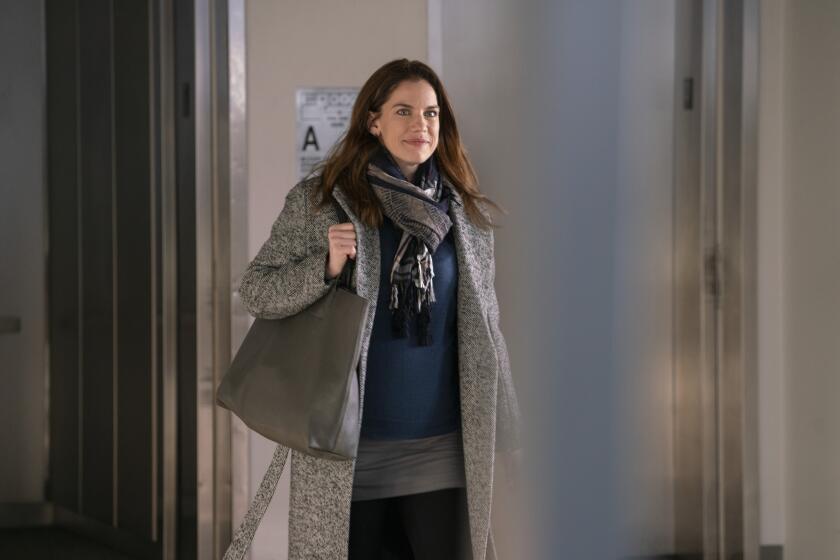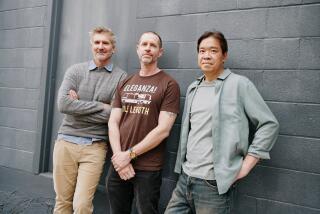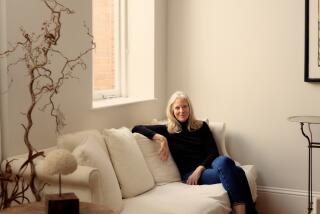‘Apple Cider Vinegar’ tells how Belle Gibson went from revered influencer to reviled scammer

- Share via
In the early years of Instagram, a young Australian mother named Belle Gibson rapidly became one of the most popular wellness influencers on the platform, inspiring thousands of followers with her story of overcoming malignant brain cancer with a healthful diet and alternative medicine treatments.
Claiming that she was given four months to live after being diagnosed in 2009, Gibson said she ultimately rejected chemotherapy and radiotherapy and embarked on a quest to heal herself naturally “through nutrition, patience, determination and love.” Her inspirational tale attracted a large social media following, which Gibson leveraged into a successful lifestyle app called the Whole Pantry, a partnership with Apple and a book deal with Penguin.
The problem is that Gibson never had cancer. As eventually became clear, she’d also lied about countless other things — from her age (she was three years younger than she claimed to be) to her professed support for various charities (she hadn’t given them any money until reporters started asking). As her story unraveled publicly in 2015, Gibson went from media darling and celebrated girl boss to national pariah — like an Australian Elizabeth Holmes.
Series creator Liz Meriwether and director Erica Watson on Linda Tanner, Billy Evans, Sunny Balwani and how they decided to end Elizabeth Holmes’ saga.
The twisted saga is now the focus of “Apple Cider Vinegar,” now streaming on Netflix. Created by Samantha Strauss, the six-episode series is adapted from “The Woman Who Fooled the World: The True Story of Fake Wellness Guru Belle Gibson” by Nick Toscano and Beau Donelly, the investigative journalists who exposed Gibson’s scam through their reporting at Australian newspapers the Age and the Sydney Morning Herald.
Kaitlyn Dever — doing an astonishingly convincing Australian accent — stars as Belle, playing the wannabe guru as a lonely but conniving young woman who uses lies to evoke sympathy. But she is not the sole focus of the drama, which also follows Milla Blake (Alycia Debnam-Carey), an influencer who touts the cancer-fighting benefits of vegetable juice and coffee colonics; and Lucy (Tilda Cobham-Hervey), a young woman undergoing brutal cancer treatments who finds herself drawn to Belle and Milla’s seemingly gentler remedies. The series toes a delicate line, showing why alternative remedies can be so appealing to patients frustrated with traditional medicine, but also illustrating how dangerous charlatans are willing to exploit that desperation for personal gain.

“The allure is so powerful because it seems kinder, easier, prettier. We didn’t want to just say medicine good, wellness bad, because there are beautiful things like community that people don’t find necessarily in hospitals,” says Strauss in a video call from Australia. Because cancer treatments like radiation and chemotherapy can leave patients feeling completely depleted, “It’s intoxicating to want to run away from that and go to the person promising, I’ll fix you in an easier way.”
The show’s title alludes to the idea of a magical yet readily available remedy in a bottle, and the flawed notion that “you can outsource wellness instead of doing all the boring, medically proven things” to maintain health, she says.
In Screen Gab no. 24, we revisit work by the late Ivan Reitman, look at the journalism in “Inventing Anna” and hear what Jeffrey Wright is watching.
Like many in her home country, Strauss became aware of Gibson around the time she granted a disastrous, laughably evasive interview to Australia’s “60 Minutes” in 2015. (When asked her age, Gibson, dressed in a bright pink turtleneck sweater, replied, “I’ve always been raised as being currently a 26-year-old.” She was actually 23.)
“There was a lot of talk at the time about her pink jumper and just how excruciating it was to watch,” Strauss says. “She just felt so young and way in over her head, not that it’s excusable. The other thing I found interesting was the recklessness of the industry all around her — the publishers who published her book without fact-checking and the wellness industry that loved to prop her up as this golden girl and heroic mum who’d beaten cancer.”
For Dever, the subject matter is intensely personal: her mother died last year following a protracted battle with breast cancer. “I became quite obsessed with the wellness world and non-conventional therapies because I was looking for other options for my mom, who was still doing all the conventional stuff at the same time,” says Dever, in a Zoom interview with her co-star, Debnam-Carey. “I learned that there was a whole world out there of information that does offer a lot of hope.”
“Apple Cider Vinegar” is the latest series in what has become a thriving subgenre about scammers and con artists, especially women — from “The Dropout” to “Inventing Anna.” Though most of the action takes place a decade or more ago in another hemisphere, its themes of medical quackery, alternative facts and social-media echo chambers are more relevant than ever in 2025.

“Where we’re getting our news from, and what rabbit holes we’re down, completely seem to inform and infect our belief system,” Strauss says. “We are seeing how dangerous it is to become so tribal, because it just takes you away from facts.”
“Apple Cider Vinegar” avoids spoon-feeding a tidy version of events to the audience, instead using a scrambled timeline and shifting narrative perspectives to complicate the narrative. A disclaimer at the front of each episode calls the series “a true story based on a lie.”
There’s also a repeated caveat, delivered by various characters speaking directly to the camera: “Belle Gibson has not been paid for the recreation of her story.” The reference hardly seems accidental: Netflix was criticized for paying fake heiress Anna Sorokin a hefty fee for the rights to adapt her life story into “Inventing Anna.”
In Australia, Gibson remains a widely reviled figure. “I was talking to a friend whose partner was dying of brain cancer, and they were horrified that I was telling this story. They’re like, ‘Belle is going to profit from this. She’s going to become more famous.’ And I was like, no, no,” Strauss says. “I felt like it was just so important to tell the audience right up front [that she wasn’t paid].”
“I’ve never met Belle, so my version of Belle is based on the facts the journalists had written in the book and my research. I created who I imagined Belle might be,” Strauss continues. “If real Belle called me up, she would point out all the things that I got wrong.”
The series never excuses Gibson’s behavior or attributes it to a single cause, instead presenting her as someone with a desperate need for approval that was fueled by social media. “I think probably never feeling enough and wanting to prove people wrong is at the very core of her,” Strauss says.
Like the real Gibson, the series version of Belle grew up in the dingy suburbs of Brisbane, and as a dark-haired goth teenager became active on skateboarding forums, where she first started spinning tall tales about her health in a bid for attention. The show’s version of Belle views sickness as “a shortcut to being loved and to getting out of things. If you’re sick, people can’t be mean to you,” says Strauss.

In her quest for internet fame, Bella models herself on Milla, a rising social media star. Instead of amputating her arm to stop the spread of cancer, as her doctors urged her to do, Milla turns to a severely restricted diet consisting primarily of juice. Milla’s choices are vexing, but her frustration with the condescending medical establishment is also understandable.
“The conventional medical industry can feel really sterile and impersonal, as much as it is incredible in what it’s able to accomplish,” Debnam-Carey says. “While it’s hard to watch [Milla rejecting medical advice], you come away with some compassion for that decision and why she’d want to find different alternatives.”
Milla is a composite character, but her story is similar to that of Jessica Ainscough, a self-proclaimed “wellness warrior” who was diagnosed with a rare cancer in her early 20s and pursued alternative treatments including Gerson therapy, a dietary regimen involving hourly consumption of fresh vegetable juice. The cancer spread and she died in 2015 at 29. As documented in “The Woman Who Fooled the World,” Gibson was strangely fixated with Ainscough, even attending her funeral.
For the Milla character, Strauss researched orthorexia, an eating disorder in which people are obsessed with “healthy” food, and also delved into the history of alternative medicine retreats like the one Milla visits in Mexico.
By the end of “Apple Cider Vinegar,” Gibson’s app and book have been pulled from the market, but her scam has had dire consequences. There is no postscript to tell viewers what happened to Gibson after the scandal blew up, or whether she faced any consequences. Instead Dever, in character as Belle, tells the audience to Google it for themselves. They may find the results disappointing: In 2017, a court ordered Gibson to pay $410,000 in fines for her false claims. As of 2021, she had not yet paid the fines, and authorities began to seize her assets. She also resurfaced briefly in 2020, claiming she had been “adopted” by Melbourne’s Ethiopian community. (Spoiler alert: She had not.)
Gibson will soon be thrust back into the global spotlight thanks to Netflix. But don’t expect her to get the celebrity treatment, says Strauss. “I don’t think she’s going to go on ‘Dancing With the Stars’ in Australia after this.”
More to Read
The complete guide to home viewing
Get Screen Gab for everything about the TV shows and streaming movies everyone’s talking about.
You may occasionally receive promotional content from the Los Angeles Times.








